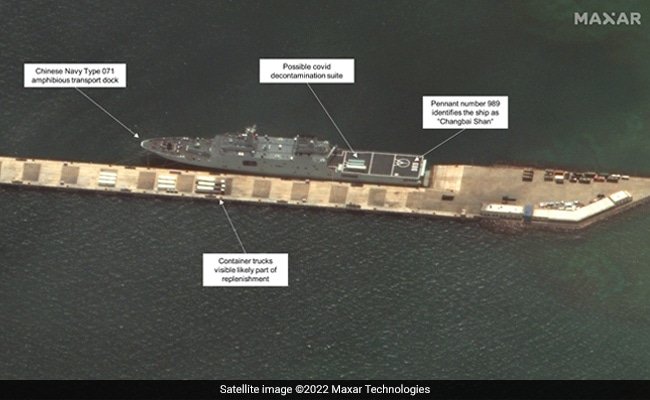
A Chinese spy ship, masquerading as a ‘research’ vessel, is en route to Maldives and has set alarm bells ringing in New Delhi, amid a simmering row with Male that erupted this month after three Maldivian ministers made comments critical of Prime Minister Narendra Modi.
The Marine Tracker app shows the Chinese ship now sailing off the coast of Indonesia after having navigated the Sunda Strait between Java and Sumatra, and it is due in Male on February 8. According to leading Geospatial expert Damien Symon, the ship surveyed these waters in 2019 and 2020.
XIANG YANG HONG 03 the Chinese ocean research vessel heading to Male, Maldives is no stranger to the region, having conducted ocean surveys in 2019 & 2020, the vessel has been observed in the IOR, Bay of Bengal & Arabian Sea raising fresh concerns in #Indiahttps://t.co/WsiMOzjYkZpic.twitter.com/8iDzCSuVEg
— Damien Symon (@detresfa_) January 22, 2024
The ship’s presence on the edge of the Indian Ocean Region, or IOR, comes days after Maldives President Mohamed Muizzu’s all-smiles meeting with China’s Xi Jinping in Beijing, in visuals that appeared to underline a pivot to China – a potentially key geopolitical and military shift in the IOR.
Mr Muizzu, elected on the back of an “India Out” campaign, has already issued one demand to Delhi – to withdraw, by March 15 – the nearly 100 Indian soldiers and military assets in the Maldives.
China’s Maldives Spy Ship
The 4,300-ton Xiang Yang Hong 03 is classified as a ‘research’ vessel that is mapping the floor of the Indian Ocean floor. Research exercises like this can provide valuable data that can help anticipate natural disasters like underwater earthquakes, and mitigate otherwise disastrous impacts. Mapping the floor also enables China to navigate these waters in the future using submarines and submersible drones.
The Xiang Yang Hong 03 is far from the first Chinese spy ship to operate in the IOR over the past few years – another red flag for the Indian government. China-flagged ‘research vessels’ and warships have been spotted at four locations off India’s southern and western coasts, including Sri Lanka.
An overlay of these four locations – Hambantota in Sri Lanka, Karachi in Pakistan, Djibouti in the Horn of Africa, and now Maldives – seems to suggest Beijing is cut off India’s west coast.
Chinese Naval Base In Djibouti
In August 2022 NDTV was the first to access satellite images that showed a Chinese naval base in Djibouti was operational, and could support Beijing’s warships, as well as helicopters, in the region.

The Chinese Type-071 landing ship is the backbone of China’s amphibious assault forces, used for logistics missions and transporting vital supplies. With inputs from Damien Symon (Satellite image 2020 Maxar Technologies) High-res here
The Djibouti base is built in a “fortified way, with layers of defences that appear almost medieval… and is clearly designed to withstand direct assault”, a naval analyst told NDTV then.
NDTV Exclusive | Satellite Pics: China’s New ‘Mission Indian Ocean’ Targets India
That was its first overseas military base, but it is unlikely to be its last.
China In Hambantota
In July last year British publication The Guardian flagged Hambantota, Bata in Equatorial Guinea and Pakistan’s Gwadar as possible future Chinese overseas naval bases. The report flagged the Sri Lanka port – built thanks to a $307m loan from a Chinese bank – as the next most likely base.

A Chinese firm took control of Hambantota, which is also expected to be able support warships, for $1.2 billion in 2017 as the Sri Lankan government battled the initial stages of its economic crisis.
Around the same time as NDTV reported on the Djibouti base, a Chinese ship with the ability to track satellites and intercontinental missiles docked at Hambantota. It stayed there for six days.
READ | Chinese “Spy Ship” Docks At Lanka Port Amid Snooping Concerns In India
India had expressed concern over the ship – Yuan Wang 5, which has sensors that can track ballistic missiles when fired. The Indian government tests its missiles from an island off the Odisha coast.
READ | 5 Reasons Why Chinese Ship At Sri Lanka Port Is A Concern for India
Nevertheless, Yuan Wang 5 was allowed to dock on the condition it kept its Automatic Identification System (AIS) switched on while in Lankan waters and did not carry out ‘research’.
A few months later another Chinese spy ship – the Yuan Wang VI – entered the Indian Ocean ahead of a missile test by India. All of this was after Lanka, in 2014, allowed a Chinese nuclear-sub to dock.
Warships In Karachi
And, in November last year, high-res satellite images acquired by NDTV indicated the presence of frontline Chinese warships, a submarine and fleet support ships at Karachi harbour.
NDTV Exclusive | Chinese Submarine, Warships In Karachi – What It Means For India
On paper this was part of a joint naval exercise between the two nations, but it underlines the ability of the Chinese military to access points in and around the Indian coastline.
A month before that another Chinese ‘research’ vessel – Shi Yan 6 – was given 48 hours to conduct marine research off Sri Lanka’s west coast, under supervision.

Chinese Type-52D guided missile destroyer along with two Type-54 frigates docked at Karachi ahead of nine-day Sea Guardian-3 naval exercises. (high res: here)
The process of tracking Chinese naval assets is a constant effort for the Indian Navy.
Chinese vessels sail west to enter the waters of the IOR through key choke points – the straits of Malacca, Lombok or, in the case of the Maldives-bound ship, Sunda. Indian Navy P-8 maritime recon aircraft and mission-deployed warships are often positioned to intercept and track these vessels.
NDTV is now available on WhatsApp channels. Click on the link to get all the latest updates from NDTV on your chat.




